Article updated: September 24, 2023
Hello. Any encumbrance/restriction on real estate undergoes state registration and is entered into the Unified State Register of Real Estate.
(abbreviated as EGRN). Therefore, all information about the encumbrance on real estate is displayed in the Unified State Register of Real Estate , namely what kind of encumbrance it is, in favor of whom it is imposed and for what period (if any).
Personally, I do not use the Rosreestr website and I do not advise you to . The reason is that free (reference) information from the Unified State Register is not often updated on the Rosreestr website, or is simply uploaded there incorrectly.
In the USRN itself, the information is correct and up-to-date; only the information on the website itself is “lame”. Often, instead of a specific encumbrance, it may be written “Other restrictions (encumbrances)” and sit and wonder what exactly this means.
All this also applies to other free services - they take all the same information from the Rosreestr website and simply display it on their own.
Instead of the Rosreestr website, I check the encumbrance in the extract from the Unified State Register of Real Estate , because... it contains all relevant information at the time of the request.
If you still decide to use the Rosreestr website, here are detailed instructions with pictures:
- 1. Go to this page of Rosreestr - Reference information on real estate objects online.
- 2. Enter the apartment address or cadastral number, enter the captcha and click on “Generate a request”.
For clarity, I have prepared examples of entering apartment addresses: example No. 1, example No. 2, example No. 3, example No. 4.
If you need Moscow or St. Petersburg, look for them in the “Subject” drop-down list in the “Address” block. If you need other cities and locations, then select the region/republic/district in the “Subject” list, then select the desired city or district in the “District” list. If you need a town/village/village, look for it in the “Settlement” list.
Next, select “Street Type.” Below enter: street name; House number; if necessary, the case number; apartment number.
For example, I entered the address of Moscow, Bogoslovsky lane 12a, apt. 1.
(click on the pictures to enlarge them)
- 3. In the search results, click on the apartment address. If the address is not displayed, then there is no information about the apartment in the USRN.
- 4.Below, click on the “Rights and Restrictions” section. Encumbrances, if any, will be indicated on the right in the “Restrictions” subsection. If they are not present, an empty line will be shown. My example shows “Bail by force of law.” This means that most likely the apartment is pledged to the bank due to a mortgage.
As I wrote above, free (reference) information about real estate is not often updated on the Rosreestr website, or is simply uploaded there incorrectly. In the USRN itself, the information is correct and up-to-date; only the information on the site itself is “lame”.
Often, instead of a specific encumbrance, it may be written “Other restrictions (encumbrances)” and sit and wonder what exactly this means. All this also applies to other free services - they take all the same data from the Rosreestr website and simply display it on their own.
Instead of the Rosreestr website, I always check the encumbrance using an extract from the Unified State Register of Real Estate, because... it contains all relevant information at the time of the request.
Method No. 2 - using an extract from the Unified State Register of Real Estate for the property
In our case, the real estate object is an apartment. The extract contains official and currently relevant information about encumbrances/restrictions from the Unified State Register of Real Estate .
How to get an extract? If there is no encumbrance, then in section No. 2 in paragraph No. 4 “Restriction of rights and encumbrance of the property” it will be indicated “Not registered.”
If there is an encumbrance, then all the necessary information will be shown.
- Sample No. 1. In paragraph section No. 2, line No. 4 - “Deposit, the entire object.” This means that the apartment is pledged to Sberbank for a period of 240 months from 02/26/2013, i.e. it was bought with a mortgage. How to get an extract? If the statement says “Mortgage by force of law,” then the mortgage may not only be in favor of the bank. I’ll explain with an example - show an example ↓. The Ivanovs bought an apartment from Sergei. Part of the money for the purchase was paid by maternity capital. The Pension Fund of the Russian Federation transfers maternal capital to sellers within several weeks after registration of the purchase and sale transaction. The purchase and sale agreement states that until the money from maternity capital is transferred to Sergei, the apartment will be mortgaged. This is done so that the Ivanovs cannot do anything with the apartment (sell, donate, etc.) until the money from the capital is transferred to Sergei. Therefore, when registering a purchase and sale transaction, the entry “Mortgage by force of law” was made in RosReestr. After 2 weeks, the Pension Fund transferred the money to Sergei. Now the Ivanovs need to come to the Rosreestr office to remove the encumbrance from their apartment.
- Sample No. 2. Section 4.1.1 - bailiffs seized the apartment in favor of the Joint-Stock Commercial Bank for the Promotion of Commerce and Business. In section 4.1.2 - “Mortgage, the entire object.” The arrest was registered in 2015 due to late mortgage payments. How to get an extract?
- Sample No. 3. In paragraph section No. 2, line No. 3 “Restriction of rights and encumbrance of the property” - “Not registered.” This means there are no encumbrances/restrictions on the apartment. How to get an extract? (click on samples to enlarge them)
Service for ordering an extract from the Unified State Register of Real Estate, which I use myself
Any person (not even a citizen of the Russian Federation) can order an extract for any real estate in the Russian Federation. They are provided electronically and in paper form. An electronic statement is more convenient for me: 1) it costs 250 rubles.
, and the paper one is already 400 rubles; 2) you don’t need to go anywhere - after payment the statement will be sent by email; 3) easily opens on a computer or phone - no additional programs need to be installed.
Can be printed.
Previously, I ordered electronic statements on the official website of Rosreestr, but now I use its partner service Ktotam.pro (I indicated the reasons in the next paragraph). The cost of statements on both sites is 250 rubles , but in Ktotam.
about you can order 5 statements for 150 rubles . How to order an extract is written below, how to order a package of extracts is here. Who's there.
it takes official information from the Unified State Register of Real Estate, and not from any of its databases, because along with the extract they will send a digital signature of the Rosreestr registrar (EDS).
Why did I start using Whotam.pro? 1) statements are sent on average within 1 hour.
We had to wait an average of 47 hours from Rosreestr; 2) statements are sent immediately in readable form - you can open them on a computer or smartphone, no additional programs are required. You will receive an extract from Rosreestr in an unreadable format.
xml and you will have to remake it into a readable form. 3) It is easier to fill out the order fields and there are few of them. The Rosreestr website is inconvenient, there are many fields for ordering and you need to enter your passport data.
Instructions for ordering an extract on Ktotam.pro with pictures
For clarity, I ordered an extract from the Unified State Register for an apartment at the address Moscow, st. Vostochnaya, 13. For obvious reasons, I don’t show the apartment number.
- Go to Whotam.pro . Technical support: [email protected] , [email protected] . You can also ask me questions in the comments, but keep in mind that I am not the owner of the service, I only use it in my work.
- Enter the address of the apartment and click on the “Find” button.
This is what happened to me.
(click on pictures to enlarge)
In the “Street” field, enter only the name of the street, alley, boulevard, etc. Examples of addresses: example No. 1, example No. 2, example No. 3, example No. 4.
If the apartment address has a building, then do not worry about the lack of a corresponding field. Just enter the address without the body and click on the “Find” button. In the next window, select the address that contains the desired building.
If you need the city of Moscow or St. Petersburg, then enter that in the “Region” field. To search for other settlements, first enter the name of the region, then the settlement.
- In the window that opens, check the address and click on “Select object”. “There is no information in the electronic database of the Unified State Register of Rosreestr.” What to do? ↓
This means that the last transaction on this real estate was before 2000, and Rosreestr has information since 2000 (in some regions since 1998). Until 2000, transactions were registered in the BTI, which is why the BTI contains information about copyright holders. But the difficulty is that only the property owners themselves can request this information.
- Select “Extract from the Unified State Register of Real Estate for a property - 250 rubles.” and click on "Next" .
- In the field, enter the email address (e-mail) to which you will receive the statement, and click on “Next” .
- Select a payment method, click on the “Pay” button and pay for the order.
If you select “Other methods”, then you will be given a choice of payment via Qiwi, terminal, mobile phone balance, electronic wallet, etc.
- Activate your personal account.
After payment, a letter will be sent to your email containing the login and password for your personal account in the Ktotam.pro service (1). In the letter, click on the “Activate Personal Account” button (2). Check your Spam folder, sometimes the email ends up there.
(the letter looks like this)
- A message about account activation is shown . You can close the window.
- Log in to your personal account to make sure your order is being processed..
To enter your personal account: 1) click on the “Login” button in the top right; 2) in the window that opens, enter your email and password; 3) click on “Login”. Let me remind you that the password was sent in the email with the account activation.
When you log in, you will be immediately redirected to the “My Statements” page. Scroll down to see your statement. It will show on the right that the order is being processed.
In the “Profile” section, you can indicate your phone number to receive an SMS notification that your statement is ready.
- As soon as the statement is ready, you will be notified by email (if you indicate your phone number in your profile, you will be notified by phone when your extract is ready). Check your Spam folder.
To just look at the statement, click on the “View” button. By clicking on “Download PDF”, the statement will be downloaded in pdf format and can also be immediately opened on your phone/computer using a browser.
The statement can also be downloaded from your personal account . Click on the middle "PDF" button. The statement will be in pdf format and can be immediately opened in any browser on your phone or computer.
To print, click on the right button with the printer sign. To download the archive with the source extract files, click on the left “EDS” button. The archived statement will be in xml format. File in .
sig is the registrar’s electronic signature (EDS).
Here is the extract that I ordered. She was ready in 50 minutes. In section No. 2 in paragraph No. 3 “Restriction of rights and encumbrance of the property” it is indicated “Not registered”.
Package offers in Whotam.pro
(to enlarge the picture, click on it)
The package is valid for 1 year. Order like this:
- Go to the page “Ktotam.pro - Tariffs and package offers”.
- Scroll down and select a package.
- Enter your email and click “Next”.
- Select a payment method and pay for your order.
- After payment, a letter will be sent to your email containing the login and password for your personal account in the Ktotam.pro service (2). In the letter, click on the “Activate Personal Account” button (1). Check your Spam folder, sometimes the email ends up there.
(the letter looks like this)
- Log in to your personal account: 1) click on the “Login” button in the top right; 2) in the window that opens, enter your email and password; 3) click on “Login”. Let me remind you that the password was sent in the email with the account activation.
When you log in, you will be immediately redirected to the “My Statements” page. On the right you will see the number of statements in your package and until what date it is valid.
- How to order statements is written here (steps No. 1 to No. 4). They can be downloaded in your personal account or in an email (step No. 10).
In this way you can find out encumbrances on any real estate, for example, on a land plot.
How to find out for free whether there are encumbrances (restrictions) on an apartment and other real estate
Not everyone knows that you can check data on any real estate in our country, completely free online, regarding the presence of restrictions on rights and encumbrances. And this information will be truthful and relevant. Since it is taken directly from the only reliable source for real estate accounting - EGRN (Unified State Register of Real Estate Rosreestr).
You can find out about restrictions and encumbrances on the following real estate:
- Apartment;
- House;
- Land plot;
- room;
- Non-residential premises;
- Building;
- Unfinished construction site.
Verification of restrictions and encumbrances online (step-by-step instructions)
Let's say we need to find information on a non-residential premises located at Novosibirsk, st. Kommunisticheskaya, 34/1, cadastral number 54:35:101520:340.
- We go to the Rosreestr website using the link - https://rosreestr.ru/wps/portal/online_request
- Enter the cadastral number and captcha digital code. Click the “Generate request” button. The search for a property can be done using different parameters: cadastral number, conditional number, address or title number. But it’s better to search by cad. number to avoid errors.
- A page opens with the address of the property and cadastral number. Click on the address highlighted in blue, as shown in the picture.
- Next, a window with an object card will open. Be sure to click on the “Rights and Restrictions” tab to find out more information.
We see that there are 2 restrictions on this property in the form of a prohibition to perform registration actions with real estate:
- No. 54:35:101520:340-54/001/2017-1 dated 09.27.2017 (prohibition);
- No. 54:35:101520:340-54/001/2017-2 dated 10/17/2017 (prohibition).
This way we can find out the number of the encumbrance (restriction) and the date of its registration.
To find out the basis document on the basis of which the encumbrance (restriction) was imposed, as well as who did it and the period for which the encumbrance (restriction) was established, you need to order an extract from the Unified State Register of Real Estate.
Now let's see how this information is presented in a real extract from the Unified State Register of Real Estate.
Restrictions and encumbrances in the extract from the Unified State Register
In the extract from the Unified State Register of Real Estate, you need to look at Section 2 “Information on registered rights.” If there are any encumbrances (restrictions), they will definitely be indicated in chronological order, as we see in the photo.
By following this link you can view the full extract from the Unified State Register of Real Estate in PDF format.
• To order an extract, fill out the form below. The statement will be sent to you by email (PDF file See sample and archive with digital signature (electronic signature). Receipt time: from several minutes to 24 hours. We work 24 hours / 7 days. Cost: 350 rubles. * sometimes there are delays more than 24 hours when Rosreestr is very busy
How to check the cleanliness of an apartment when purchasing?
Buying an apartment is a rather complicated process, especially from a legal point of view. After all, before buying, you should check a lot of factors: whether the housing is pledged to the bank, whether it has been seized, who is the real owner of the living space, etc. Therefore, many buyers turn to professional lawyers for help. They are the ones who check the apartment for legal purity.
But contacting specialized agencies is not always advisable. Firstly, legal assistance also requires certain financial costs, and considerable ones.
And secondly, even in this field of activity you can stumble upon unprofessional employees or scammers, thereby losing not only money, but also time.
Therefore, I would like to tell you how to check the cleanliness of an apartment yourself when purchasing. So, let's begin.
Dear readers! Our articles talk about typical ways to resolve legal issues, but each case is unique.
If you want to find out how to solve your particular problem, please contact the online consultant form on the right or call the numbers below. It's fast and free!
Encumbrances on an apartment
The first thing you should pay attention to when checking an apartment is whether there are any encumbrances on it (seizure, rent, bank deposit, etc.).
) In order to find out whether the apartment is exempt from all these encumbrances, you can use an extract from the Unified State Register .
These documents can also help you find out who is the owner of the apartment, and when, and most importantly, on the basis of what documents he became the owner.
Example of an extract from the Unified State Register (click to enlarge)
But simply receiving documents is not enough. It is important to be able to check them correctly. To do this, you should compare the extracts provided to you with the documents received from the owner of the property. The details of his passport must match the data from the Unified State Register.
Please check your full name with special attention. owner, his place and year of birth, as well as document numbers. If everything fits, proceed to the next step; if not, then it’s better to refuse the purchase.
Thus, an extract from the Unified State Register helped us determine:
- Are there any encumbrances on the apartment?
- Is the information provided by the owner reliable and whether the documents have been falsified?
- Who is the owner of the apartment and on what basis.
Finding the parties to the transaction registered in ND and PND
The next thing that is usually studied when checking real estate for legal purity is whether the seller of the property is registered in a psychoneurological dispensary and a drug treatment dispensary (since after the transaction is completed, he can easily prove that at that time he was not sane and be responsible for his actions could not).
It’s very easy to find out: just ask if the seller has a driver’s license.
If it is not available, then ask him to provide a certificate from the ND and PND (the certificate is issued only to law enforcement agencies, or to the person to whom this certificate relates).
Sometimes you may have doubts about the authenticity of such a certificate. In this case, you can go directly to the PND or ND and find out at the reception or from the head physician whether this certificate was issued.
It’s good if the seller is not registered. But if this is not the case, then you can carry out a medical examination of the seller (of course, at your expense) immediately at the time of signing the documents.
Availability of registered (that is, registered) citizens in the apartment
It is very simple to check whether there are citizens registered in the apartment: just study the extract from the house register .
From it you will find out whether there are registered citizens (possibly minors) in the apartment, and whether problems will arise when deregistering them.
If you have doubts that the document is genuine, then go with a copy of the extract to the passport office of the housing department or REU.
Example of an extract from a house register (click to enlarge)
Have the rights of minors ever been violated during the privatization of housing?
It is also important to know whether the rights of minors were ever violated during the privatization of housing. If the current owner is no longer the first owner of the property, then there is a possibility that in the past, when transferring rights to property, the rights of minors were violated, and therefore, the purchase of an apartment may have certain consequences.
In order to find out about this, you will need an extended extract from the house register , which is provided for a fee. This document will indicate all citizens who were once registered in the apartment, as well as information about them. Therefore, be sure to check who was registered in the apartment at the time of its privatization and what the age of these citizens was.
Please note that if there were minors among the registered ones, then they must also participate in privatization. If this was not done, then they may try to invalidate your transaction.
Therefore, to avoid such situations, if you find potential applicants for ownership, ask them to write a statement of refusal of ownership, certified by a notary.
Possible claimants for ownership
Any citizens who have ever been registered in an apartment and have ownership rights can potentially become applicants for ownership. Therefore, such citizens need to be checked especially carefully.
An extended extract from the house register can also help you with this, which should indicate when, who, where and for what reason was discharged from the apartment. If the tenant died, the death certificate number must be indicated, as well as its date and time.
If a person went on a business trip for a long period of time, ended up in prison or at a place of military service, it must be indicated when this happened, as well as the address to which the citizen was sent, the number of the court decision or the place of military service, depending on the reason departure.
Please note that in all three cases the tenant had to return and was required to register him again at his place of residence.
Pay special attention to people who left before privatization began. When checking residents, you should be very careful not to miss a single person. Let me note that we are not talking about home owners, but about people who have the right to use housing (residence), that is, registered at this address.
The last thing you need to do when checking the legal purity of an apartment is to compare all the documents you have studied . That is, information about who, when and until what point was the owner of the apartment, or was registered in it, should be the same both in the Unified State Register and in the extended extract from the house register, as well as in all related documentation.
Bottom line
We have reviewed the most important criteria for checking the legal cleanliness of an apartment. Most specialized agencies use approximately the same method. Let's summarize how to check the purchased apartment:
- Check for any encumbrances on the apartment in the form of rent, arrest or being pledged to the bank (using the Unified State Register of Real Estate).
- Check whether the current owner of the property is registered with the PND or ND (using a driver’s license or a certificate from the ND or PND).
- Check the presence of citizens registered in the apartment, including minors (according to an extract from the house register).
- Check whether the rights of minors were violated during the privatization of housing (using an extract from the house register and the Unified State Register).
- Check the possible rights to real estate of persons who were once registered in the apartment (according to an extract from the house register).
- Compare the information obtained from the documents you have studied.
And finally, a few more tips:
- If the current owner has assumed ownership by inheritance, then do not forget to request from him a statement that he will bear all costs and expenses in the event of discovering other heirs of the property, certified by a notary.
- Don't forget to check whether redevelopment has been carried out. If so, was it legalized? You can find out by taking the BTI plan and comparing it with the appearance of the apartment. In the event that you purchase an apartment with illegal redevelopment and the fact of its existence is discovered, then all responsibility will fully fall on you.
- Ask the seller for a certificate confirming that there are no debts for apartment maintenance (electricity, gas, water supply, heating, etc.). We can say that all maintenance debts are sold along with the apartment.
- Ask the seller for a receipt containing the amount you paid for the apartment. This is especially important if the price specified in the contract and the actual amount of funds transferred to the former owner of the property differ. In this case, there should be two notes: the first indicates the price of the property specified in the contract, and the second indicates the actual amount of funds transferred to the seller.
- If possible, find out whether the apartment was purchased during marriage or not. Despite the fact that obtaining information about this is quite problematic, it can be very important, since all property acquired during marriage is considered jointly acquired (of course, if various types of agreements were not concluded before this), and therefore the seller’s spouse real estate may claim some part of the apartment you are purchasing. You can check this fact using a photocopy of the property owner’s passport.
- If the seller refuses to provide the certificates and documents you need or evades answers, this is a reason to think about his honesty and integrity. After all, an honest seller who wants to sell his apartment has nothing to hide, especially if all the paid documents will be paid not by him, but by the buyer.
That's all I wanted to tell you about how to check an apartment before buying. I hope that my advice will help you save money on legal consultations, as well as choose the right option for yourself. And finally, I recommend watching the following video about buying an apartment on your own: Didn’t find the answer to your question? Find out how to solve exactly your problem - call right now: It's fast and free!
Check the apartment when purchasing
home
>
Apartment inspection
The online service for checking an apartment for legal purity was created to ensure security in the real estate market. A full check is carried out using extracts from the Unified State Register of Real Estate, requesting information about the owner, FSIN databases, checking the presence of encumbrances, arrest, and whether the apartment is pledged.
- Standard search
- or
- Search by address (advanced)
Trouble finding?
send a request to a specialist
Subject:
— Select a subject - Altai Territory, Amur Region, Arkhangelsk Region, Astrakhan Region, Belgorod Region, Bryansk Region, Vladimir Region, Volgograd Region, Vologda Region, Voronezh Region, Jewish Autonomous Region.
Transbaikal regionIvanovo regionIrkutsk regionKabardino-Balkaria RepublicKaliningrad regionKaluga regionKamchatka regionKarachay-Cherkess RepublicKemerovo regionKirov regionKostroma regionKrasnodar regionKrasnoyarsk regionKurgan regionKursk regionLeningrad regionLipetsk regionMagadan regionMoscowMoscow regionMurmansk regionNenets AONi Zhegorod region Novgorod region Novosibirsk region Omsk region Orenburg region Oryol region Penza region Perm region Primorsky region Pskov region Republic of Adygea Altai Republic Republic of Bashkortostan Republic of Buryatia Republic of Dagestan Republic of Ingushetia Republic of Kalmykia Republic of Karelia Komi Republic Crimea Republic and Mari ElRepublic of MordoviaRepublic of Sakha (Yakutia) Republic of North Ossetia Republic of Tatarstan Republic of Tyva Republic of Khakassia Rostov region Ryazan region Samara region St. Petersburg Saratov region Sakhalin region Sverdlovsk region Sevastopol Smolensk region Stavropol region Tambov region Tver region Tomsk region Tula region Tyumen region Udmurt Republic Ulyanovsk region Khabarovsk TerritoryKhanty-Mansi Autonomous DistrictChelabinsk RegionChechen RepublicChuvash RepublicChukchi Autonomous DistrictYamalo-Nenets Autonomous DistrictYaroslavl Region
Area:
—
Locality:
—
Street type:
-Street EntranceSettlementsTownVillageRoadway/stopping pointRailroad boothRailway barracksRailway platformRailway stationLaneRailway postRailway sidingLivestock pointEnterBarracksQuarterKilometerRingLineSmallAvenueEmbankmentSettlementIsland ParkTransitionPlanning areaPlatformSiteplatformStationSettlement/StationSquareRural-type settlementPochinokPost officeTravellingProsekCountry LaneDiversionGardenVillageMicrodistrictSquareSlobodaStationBuildingTerritoryTractDead EndPlotHighwayAlleyBoulevardAalAul
To check an apartment, you must indicate its cadastral number or address in the search form above. Inspection of an apartment is necessary when purchasing home ownership and preventing fictitious real estate transactions. The service provides official information at the time of its request from the database of the Unified State Register of Real Estate, the Federal Bailiff Service, the Federal Tax Service, and the Federal Tax Service.
Filling out an application for receiving an official extract from Rosreestr from the Unified State Register of Real Estate (USRN) is carried out in accordance with Order No. 968: Ministry of Economic Development of Russia dated December 23, 2015. This service provides the service of filling out an application for receiving official extracts from the Unified State Register of Real Estate and legal verification of real estate.
If you decide to check the apartment yourself, then you can do this by following the instructions. Checking an apartment involves checking documents, the property and the owner’s data using official databases. First, it is necessary to check the owner’s full name with data from the cadastre so that the seller has the right to sell. If the real owner of the apartment is standing in front of you, then make sure that the apartment is not under arrest or other types of encumbrance, to do this, order an extract from the Unified Registration Registration Office in which there will be a special notes column, read them carefully and study the document. The third step is to check whether the apartment is pledged; to do this, we check it using the FPN database, and it is also worth contacting the FSSP service and checking the housing according to the register of enforcement proceedings, and the owner for open court cases. It is recommended to check the owner against the register of persons suspected of crimes.
The verification procedure is a very important step, since in 2017 more than 14,000 cases of fraud in the purchase of real estate were registered. Be sure to check the apartment yourself or order a full inspection through this service.
Checking the apartment before purchasing for debts, encumbrances, collateral. Various methods of checking and features of purchasing such apartments
Buying a home is not an easy task. The property must meet not only the requirements of aesthetics and practicality, but also not cause legal or financial inconvenience to the new owner in the future.
In this article we will tell you how to check an apartment for debts and encumbrances, what to pay attention to and how to minimize risks when drawing up a purchase and sale agreement.
○ Encumbrance: concept and types
An encumbrance on an apartment is the presence of a certain legal circumstance that prevents the full disposal of property. The restriction is caused by the fact that a third party partially owns the rights to the apartment.
When such housing is sold, the encumbrance passes to the new owner. For this reason, the cost of apartments on which an encumbrance has been imposed is significantly lower than the price of similar, but legally clear housing.
There are five main types of encumbrances: mortgage, lease, annuity, lien and trust. Let's look at each in more detail.
✔ Mortgage
With a mortgage, the lending institution gives the borrower a large sum of money for a certain (usually long) period. To ensure repayment of the debt, the terms of the loan include a partial transfer of rights to the apartment to the lender until full payment is made.
Until the borrower returns the entire amount of the debt to the lender, the property is pledged. This means that the owner does not have the right to carry out legal transactions with the apartment without the consent of the bank.
✔ Rent
Renting means providing premises to another person for temporary use for a fee. Tenants have no rights to the apartment other than the right to live in it for the period specified in the lease agreement.
Tenants can only be evicted while the lease agreement is in effect through the courts. However, this requires compelling reasons. A change of owner is not such a reason.
Clause 1 of Art. 617 Civil Code of the Russian Federation:
The transfer of ownership (economic management, operational management, lifelong inheritable ownership) of leased property to another person is not grounds for changing or terminating the lease agreement.
✔ Rent
A rent contract implies the transfer of property in the future to the rent payer for a fee or free of charge. There are three types of rent:
- Permanent - the agreement is concluded by citizens or non-profit organizations. Payment can be made in money, things, provision of services or performance of work.
- Lifetime – is in favor of one or more citizens. Payments cease upon the death of the annuitants.
- Lifetime with dependency - the annuitant transfers his property to the annuity payer into ownership. The rent payer undertakes to support and take in the recipient as his dependent for life.
Selling property with rent is possible, but along with the apartment, the buyer also acquires obligations to provide for the rent recipient. This is the essence of encumbrance.
✔ Arrest
Seizure occurs by court decision. This type of encumbrance deprives the right to dispose of real estate.
Possible reasons for arrest:
- Late mortgage payment.
- Insolvency towards individuals or organizations (for example, for housing and communal services).
- Legal proceedings regarding the apartment (for example, division of property during divorce).
The seizure can only be lifted after the debt is repaid or the required condition is met. Until this moment or without the permission of the authorized body, the sale of seized real estate is impossible.
✔ Trust management
The owner can transfer the property into trust management to another person. The manager is vested with certain powers regarding the property. For example, the owner can go abroad, and the trustee, in accordance with the agreement, will rent out the apartment, pay bills, etc.
The essence of such an encumbrance is that the object of trust management cannot be sold until the end of the contract period.
Return
○ Types of apartment debts
Another unpleasant circumstance is the presence of debt on the apartment. The situation when the buyer of an apartment, along with the housing, also acquires the debts of the previous owners for utilities, alas, is not uncommon.
Housing and communal services employees begin to demand payments from the new owner.
However, from a legal point of view, their actions are not correct. pp. 5 p. 2 art. 153 Housing Code of the Russian Federation:
The obligation to pay for residential premises and utilities arises from the owner of the premises from the moment the ownership of such premises arises.
Accordingly, debts on the apartment of the previous owner do not concern the new owner. However, the presence of debt and claims from utility companies may become a problem that will have to be resolved in court.
Return
○ Buyer risks associated with purchasing an apartment with encumbrances
We will tell you what the buyer can expect, depending on what the apartment is encumbered with.
With a mortgage, the apartment is pledged to the bank until the debt is fully repaid. Accordingly, the transaction cannot take place if the bank, as the mortgagee, does not give its written consent to the sale of the property.
When purchasing a rented apartment, there is a risk that the tenants will not want to leave the premises after the end of the lease agreement. In this case, you will have to act through law enforcement officers. It is better to wait and conclude a purchase and sale agreement after the apartment is vacated.
With a life annuity, the new owner will be obliged to support the annuitant until his death. If the annuity is constant, the payment period may be reduced. In any case, before buying such an apartment, you should weigh the pros and cons.
The presence of a lien limits the possibility of selling real estate. Such a transaction will not be registered. Therefore, before transferring any money to the seller, make sure that the apartment is not seized.
If the apartment is entrusted to a trustee, and it is he who is involved in the sale, you need to check whether he has such authority. To control the legal fate of real estate, a power of attorney certified by a notary is required.
Return
○ Drawing up a purchase and sale agreement
There are two options - concluding a deal before the encumbrance is lifted or after.
- In the first case, you must carefully consider the terms of the contract. It is imperative to describe the encumbrance, as well as the obligations of the parties in connection with its existence.
- In the second case, in order not to lose the opportunity to purchase an apartment, we recommend concluding a preliminary purchase and sale agreement. This document does not entail a transfer of ownership or obligations. The parties only agree that the transaction will be concluded in the future, when the encumbrance is lifted.
Return
○ Checking for an encumbrance or debt
Any restriction of property rights is subject to state registration in Rosreestr.
Clause 1 of Art. 131 Civil Code of the Russian Federation
The right of ownership and other real rights to immovable things, restrictions on these rights, their emergence, transfer and termination are subject to state registration in the unified state register by the bodies carrying out state registration of rights to real estate and transactions with it. The following are subject to registration: the right of ownership, the right of economic management, the right of operational management, the right of lifelong inheritable possession, the right of permanent use, mortgage, easements, as well as other rights in cases provided for by this Code and other laws.
You can find out whether there is an encumbrance by ordering an extract from the Unified State Register of Real Estate. You can get it on the official website of Rosreestr, as well as by personally contacting an institution or MFC. Any interested person can order an extract. The service is subject to state duty. An individual will have to pay 300 rubles.
You can find out about the presence of debt from the management company servicing the house. To do this, you will need a personal account statement. You can also find out if you have a debt remotely. You will need to go to the official website of the company providing housing and communal services and get the necessary data at the address.
Return
○ How to properly remove the encumbrance?
In the case of a mortgage, the encumbrance can only be removed after the debt has been fully repaid. When the borrowed funds are repaid, you must obtain a certificate from the bank and submit it to Rosreestr.
The trust management agreement terminates from the moment of sale of the management object. There is no need to take additional actions - upon registration of the purchase and sale transaction, this encumbrance will be abolished.
In other cases, you will need to obtain a confirmation document from government authorities. This could be a court decision on the division of property, a certificate of payment of debts, etc. You need to contact Rosreestr with this document to make changes.
Before signing the purchase and sale agreement and transferring money to the seller, you should make sure that the encumbrance has been removed. To do this, you need to order a repeat extract from the Unified State Register.
Return
○ Advice from a lawyer:
✔ Do I need to check who is registered?
Yes, verification is needed. To do this, ask the owner to provide an extract from the house register. There should be no registered persons in the apartment. If someone is still registered at this address, make sure that there are no problems with the statement.
It may be that the registered person is temporarily in prison, in the army, in a nursing home or other institutions. Such citizens will be able to apply for an apartment after returning.
✔ How to find out what kind of litigation there is regarding an apartment?
Information about legal disputes regarding the apartment is contained on the official website of the district court of general jurisdiction. You can find out which court to contact for information by looking at the address of the property.
Return
General Director of the law firm Mikhail Kuznetsov will talk about the main aspects when checking an apartment for legal purity.
Published by: Vadim Kalyuzhny , specialist of the TopYurist.RU portal
How to check an apartment for cleanliness of documents before purchasing?
fizkes/Depositphotos
Managing partner of Metrium Group Maria Litinetskaya answers:
In order to protect yourself as much as possible when buying real estate, you should ask the seller:
- certificate of state registration of rights and other title documents (sale or inheritance agreement, donation, privatization, etc.);
- extract from the Unified State Register;
- an extract from the house register about the absence of registered residents, which can be obtained at any MFC. This document confirms that all persons who previously lived in the apartment have been deregistered;
- a debt certificate from the MFC confirming the presence of debts on utility bills;
- a certificate from a narcological and psychoneurological dispensary.
Using an extract from the Unified State Register, the buyer can find out whether the seller really is the owner of the apartment. In this case, you can order both a “simple” statement and an extended version.
In the second case, in addition to the last name, first name and patronymic, information about title documents or the “history” of the apartment from the moment of the first entry about it in the unified state register is provided.
Relatively speaking, this document will make it possible to understand who previously owned this apartment and how often it was sold.
When checking an apartment, you should not limit yourself only to an extract from the Unified State Register. It is imperative to pay attention to the following points. Often apartments are sold by proxy, and the owner takes virtually no part in the transaction.
Such objects can be classified as a risky category, because very often such powers of attorney are obtained fraudulently. In this case, the buyer can play it safe by getting the contact of the direct owner of the property from a trusted person, and then contact him to confirm the fact of the sale of the apartment.
Or, for example, an apartment is put up for sale immediately after inheritance. In this case, it is better to be careful, because the possibility of new heirs cannot be ruled out, who, by law, have the right to challenge the purchase and sale of inherited real estate in court within three years.
In addition, the apartment may have undischarged tenants or the housing may be owned by several people. In the extract from the Unified State Register, you need to pay special attention to the “Encumbrance” column. It indicates whether the apartment is mortgaged.
It happens that the default on the mortgage amounts to a meager amount, and then the seller can pay off the debt from the deposit paid by the buyer, which will allow both parties to complete the transaction with peace of mind.
Unfortunately, even if you have checked the legal purity according to all the rules, there is always a possibility that you will lose the property. For example, if a citizen can prove that his rights were infringed during the sale of an apartment, now yours. Moreover, you may have to deal not with the seller, but with the owner who owned the apartment before him.
Which secondary apartments are not worth buying? Legal aspects
5 types of fraud when selling secondary apartments
The founder and general director of the company “33 Elephants” Igor Kalganov answers:
It’s quite easy to check an apartment yourself before purchasing it. It is necessary, with the help of the current owner of the apartment, to obtain basic documents confirming the absence of legal and other risks when purchasing real estate (the owner personally receives the documents or entrusts these actions to a representative by proxy).
List of documents required to verify real estate:
- technical, cadastral passport, floor plan, explication of the property (allows you to check the exact area of the apartment, as well as the presence of uncoordinated redevelopments);
- extract from the Unified State Register of Real Estate (to check the absence of encumbrances);
- an extract from the Unified State Register of Rights to the property (to track the entire chain of apartment owners);
- extract from the house register (obtaining information about persons registered in the apartment at the moment);
- certificate from the passport office in form 9 (extended, archival) - to obtain information about all persons registered in the apartment, as well as about the absence of temporarily discharged persons;
- a copy of the financial and personal account, a certificate from all utilities and household services about the absence of debt for utility services.
Documents under clauses 1-3 can be obtained from the “Unified Center for Public Services”. According to clauses 4 and 5, you must contact government service centers, passport offices or the management company at the location of the property.
The lawyer of the managing real estate agency "Agency.net" Igor Polsky answers:
Protecting yourself on your own without involving a lawyer is a task that is only partially feasible if the object initially has a good history and the counterparty is not faced with the task of misleading the other party. But everyone can check the main points and understand in time that the property is not worth buying.
Current market trends are such that most sellers do not want to show documents for an apartment until they receive an advance payment for a future transaction. But it is impossible to hide the exact address of the apartment, and when viewing the property, it is enough to remember the apartment number. The rest of the information is in the ad.
At the apartment address, anyone can order an extract from the Unified State Register through the MFC or Rosreestr authorities. This statement contains most of the data that is needed for the initial verification of the object.
If everything in the statement is “clean”, and the owners have confirmed their identity with a passport (the passport can also be checked on the FMS website), you can safely make an advance payment.
After making an advance payment, you receive all the necessary documents for a more in-depth inspection of the property you are purchasing. Using an extract from the house register and an extract from the financial and personal account, you can see all the residents registered in the apartment, as well as whether the property has debts on utility bills.
If you have information about the owner, you also have the right to check for the presence of legal disputes and enforcement proceedings in relation to the property or the owner himself. This is done through government information resources.
If after all the checks nothing suspicious is found, and the history of the object does not contain questionable transfers of rights, then in 99% of cases the object can be purchased.
When selling an apartment, the owner in the vast majority of cases knows the history of his property and how legally clean it is. The stumbling block is the settlement between the parties to the transaction.
There are several payment methods: letter of credit, individual bank safe, cash payment upon signing the alienation agreement.
As for the latter, it is not safe for the buyer, since the risk of giving away money and not waiting for the transfer of rights in favor of the buyer is extremely high. Payments through a bank are much safer, but it is important to pay attention to what is the condition for accessing money.
This determines who retains the key in case of settlements through the depository, and at what point a receipt is written confirming the receipt of funds for the sale of the property.
Checking the legal cleanliness of an apartment: 10 pain points
5 main risks when buying an apartment on the secondary market
Dmitry Baryshnikov, executive director of the Linkor Real Estate consulting center, answers:
First, you should find out the history of the apartment that has been selected for purchase. This can be done by requesting an extract from the Unified State Register of Rights to Real Estate and Transactions with It (USRP). This extract indicates cases of seizure, existing restrictions on the disposal of property, etc.
Russian legislation establishes a general limitation period of three years, so it is necessary to monitor whether any conflict situations related to this living space occurred during this period. A serious risk factor is that the apartment has changed owners several times, especially if the transactions took place by proxy.
Secondly, you need to find out what document confirms the seller’s ownership. There are several options:
- contract of sale;
- barter agreement;
- gift agreement;
- certificate of inheritance;
- annuity agreement;
- a court decision that has entered into legal force.
The last two documents are the least common. However, any of the above must be original and not contain any blots.
It is also necessary to carefully study the agreement on the basis of which the state registration of property rights was carried out. The contract may specify conditions, if not met, it is subject to termination. Accordingly, it is necessary to check whether these conditions have been met.
For example, the buyer (at the moment already the owner selling the living space) had to pay the full cost of the apartment some time after the purchase.
If this condition is not met, the contract must be terminated, and, therefore, you risk being drawn into lengthy litigation with an unpredictable result.
What is the risk of buying an apartment that was privatized in the 90s?
5 signs your real estate agent is a scammer
Another important point is the effective date of the agreement. The hasty sale of an apartment that was recently inherited or donated by a person who is not a relative raises suspicions.
Thirdly, you should pay attention to the seller’s documents. You can check your ID by contacting the passport office. If we are talking about a representative who acts under a power of attorney, then it is important that it be notarized.
Fourthly, it is necessary to trace the presence of third parties who can claim rights to real estate, as well as the registration of minor children in the apartment.
The latter is especially important, since this situation is controlled by the guardianship authorities and if the interests of minor children are not respected, the transaction will be declared invalid by a court decision.
In addition, if the owner of the apartment was married at the time of purchase, he is required to provide the consent of his spouse to sell the property.
There are many risks associated with buying an apartment. At each stage, you need to take into account many factors, check and double-check facts, dates and documents.
To make the task easier and make buying real estate less troublesome, it is better to turn to real estate professionals.
This will help not only quickly and reliably invest in real estate, but also protect yourself from scammers.
- Text prepared by Maria Gureeva
- Do not miss:
- All materials in the “Good Question” section
- Which apartment is better to buy – a new building or a resale one?
- Choose an apartment on the secondary market: advice to buyers
- 3 ways to reduce risks when buying an inherited apartment
The articles do not constitute legal advice. Any recommendations are the private opinion of the authors and invited experts.


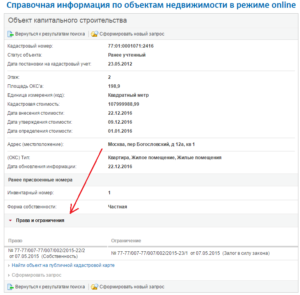
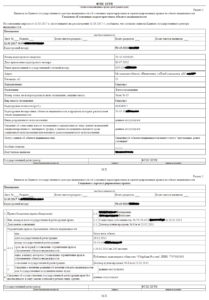 In paragraph section No. 2, line No. 4 - “Deposit, the entire object.” This means that the apartment is pledged to Sberbank for a period of 240 months from 02/26/2013, i.e. it was bought with a mortgage. How to get an extract? If the statement says “Mortgage by force of law,” then the mortgage may not only be in favor of the bank. I’ll explain with an example - show an example ↓. The Ivanovs bought an apartment from Sergei. Part of the money for the purchase was paid by maternity capital. The Pension Fund of the Russian Federation transfers maternal capital to sellers within several weeks after registration of the purchase and sale transaction. The purchase and sale agreement states that until the money from maternity capital is transferred to Sergei, the apartment will be mortgaged. This is done so that the Ivanovs cannot do anything with the apartment (sell, donate, etc.) until the money from the capital is transferred to Sergei. Therefore, when registering a purchase and sale transaction, the entry “Mortgage by force of law” was made in RosReestr. After 2 weeks, the Pension Fund transferred the money to Sergei. Now the Ivanovs need to come to the Rosreestr office to remove the encumbrance from their apartment.
In paragraph section No. 2, line No. 4 - “Deposit, the entire object.” This means that the apartment is pledged to Sberbank for a period of 240 months from 02/26/2013, i.e. it was bought with a mortgage. How to get an extract? If the statement says “Mortgage by force of law,” then the mortgage may not only be in favor of the bank. I’ll explain with an example - show an example ↓. The Ivanovs bought an apartment from Sergei. Part of the money for the purchase was paid by maternity capital. The Pension Fund of the Russian Federation transfers maternal capital to sellers within several weeks after registration of the purchase and sale transaction. The purchase and sale agreement states that until the money from maternity capital is transferred to Sergei, the apartment will be mortgaged. This is done so that the Ivanovs cannot do anything with the apartment (sell, donate, etc.) until the money from the capital is transferred to Sergei. Therefore, when registering a purchase and sale transaction, the entry “Mortgage by force of law” was made in RosReestr. After 2 weeks, the Pension Fund transferred the money to Sergei. Now the Ivanovs need to come to the Rosreestr office to remove the encumbrance from their apartment. 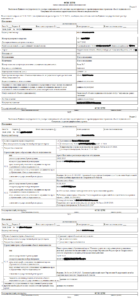
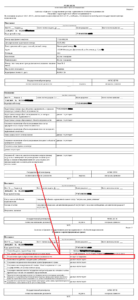
 “There is no information in the electronic database of the Unified State Register of Rosreestr.” What to do? ↓
“There is no information in the electronic database of the Unified State Register of Rosreestr.” What to do? ↓
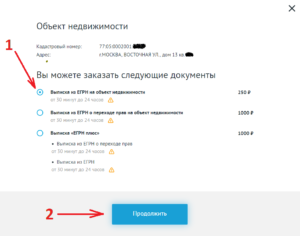
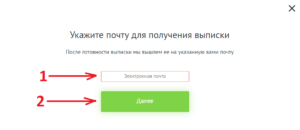
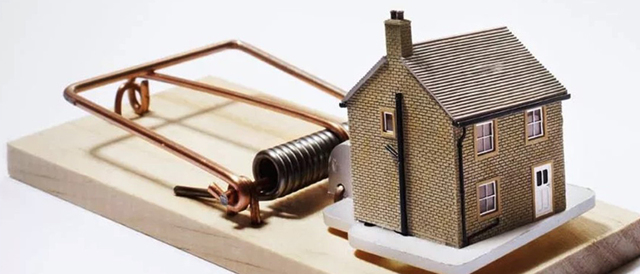
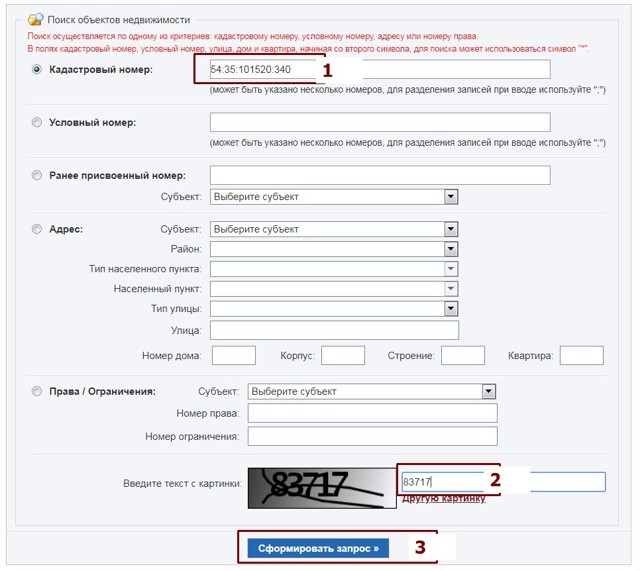

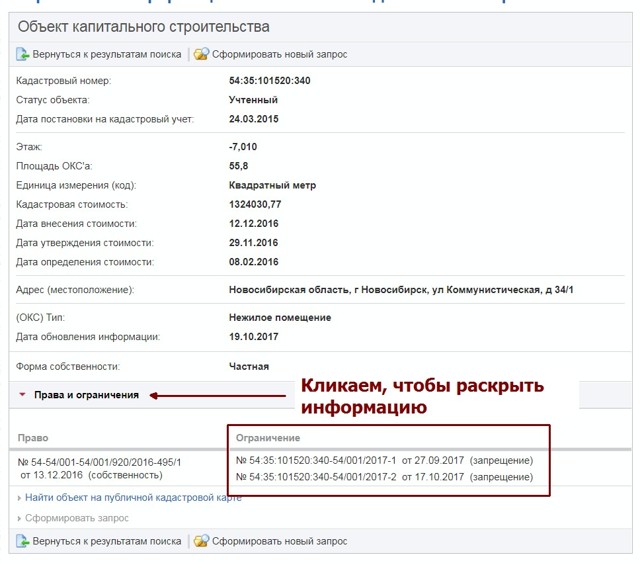
 It's fast and free!
It's fast and free! 





